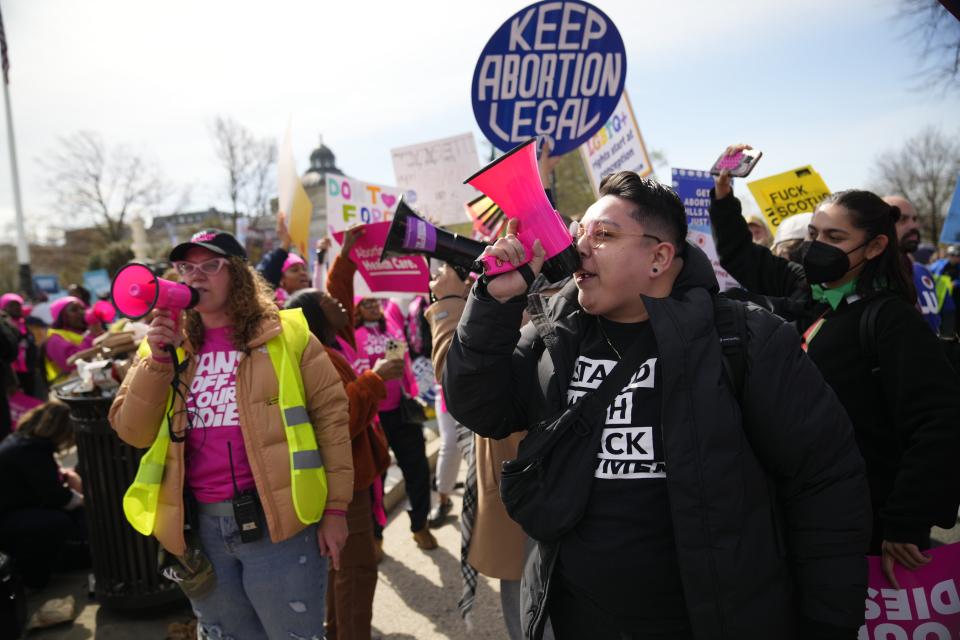Supreme Court preserves access to widely used abortion medication mifepristone

- Oops!Something went wrong.Please try again later.
WASHINGTON − Two years after erasing the constitutional right to an abortion, the Supreme Court went the other direction Thursday and tossed out a challenge to the widely used abortion drug mifepristone that would have curbed access to the drug and jeopardized the independence of the Food and Drug Administration.
The unanimous court said the anti-abortion doctors who challenged the FDA’s loosening of rules for how mifepristone can be prescribed and dispensed lacked a legitimate basis to bring their suit.
The challengers’ “sincere legal, moral, ideological and policy objections” to mifepristone don't give them standing to sue, Justice Brett Kavanaugh wrote in the majority opinion.
Instead, he said, the anti-abortion doctors can raise objections through the FDA’s regulatory process, or to Congress. And they can express their views through political and electoral processes.
More: Supreme Court arguments on abortion pill could unify judges
But, Kavanaugh wrote, "allowing doctors or other healthcare providers to challenge general safety regulations as unlawfully lax would be an unprecedented and limitless approach and would allow doctors to sue in federal court to challenge almost any policy affecting public health."
The court, however, said it's "not clear that no one else" could challenge the FDA’s relaxed regulation of mifepristone.
The decision comes in the middle of a tight presidential campaign in which reproductive rights is a major issue, and as the court has yet to decide if doctors can provide emergency abortions in states that banned the procedure after the court overturned Roe v. Wade.
'Cruel abortion bans'
"Today’s decision does not change the fact that the fight for reproductive freedom continues," President Joe Biden said.
Erin Hawley, the Alliance Defending Freedom attorney who represented the anti-abortion doctors, said her group is not giving up. She noted that Missouri, Kansas and Idaho also have challenged mifepristone.
“While we’re disappointed with the court’s decision, we will continue to advocate for women and work to restore commonsense safeguards for abortion drugs − like an initial office visit to screen for ectopic pregnancies,” Hawley said. “And we are grateful that three states stand ready to hold the FDA accountable for jeopardizing the health and safety of women and girls across this country.”
Deciding the mifepristone case on procedural grounds allowed the justices to avoid the politically thornier question of whether to second-guess the FDA’s expert opinion that the changes it made were based on extensive evidence.
First approved in 2000, mifepristone is now used in nearly two-thirds of abortions in the nation and is a reason the total number of abortions has increased even after the Supreme Court overturned Roe v. Wade in 2022.
Its use rose in recent years in part because the FDA said it could safely be prescribed through a telehealth consultation and sent through the mail. It also can be prescribed by pharmacists.
That has expanded access to the drug both to women in states where abortion is still legal and in states where it’s not.

The anti-abortion doctors had asked the Supreme Court to roll back the loosened rules after a lower court said they could not challenge the drug’s original approval.
But the high court said the doctors couldn’t do that either because they hadn’t shown they had been sufficiently harmed by the FDA’s decision.
'Health care deserts'
The doctors don’t prescribe mifepristone. They argued, however, that the FDA’s changes made it likely they would have to treat women who have emergency complications from taking mifepristone, something that is morally and ethically objectionable to them.
More: Mifepristone abortion pills to be carried at CVS, Walgreens, but not in Kentucky
The Justice Department said that there were no examples of that ever happening and that a doctor could raise a conscientious objection to treating the patient in the unlikely event they faced that situation.
The Supreme Court agreed, saying federal conscience laws “definitively protect” doctors from being required to perform abortions or provide other treatments that violate their consciences.
The court said that is true even in “health care deserts” where no other doctors are readily available.
The challenge was the first time the Supreme Court was asked to overrule an FDA decision that a drug was safe and effective. Doing so could have thrown the industry into disarray, drugmakers had warned.
More: Abortion advocates, opponents agree on one thing about SCOTUS ruling: The fight isn't over
The case sent shock waves across the medical and legal worlds last year when a Trump-appointed district judge in Amarillo, Texas, suspended the FDA’s 20-year-old approval of mifepristone. The right-leaning 5th Circuit Court of Appeals in Louisiana restored the FDA's approval but upheld other parts of his decision – setting the stage for a high court showdown that saw anti-abortion and abortion rights protesters facing off on the streets outside.
Danco Laboratories, makers of mifepristone, said the Supreme Court "maintained the stability of the FDA drug approval process, which is based on the agency's expertise and on which patients, healthcare providers and the U.S. pharmaceutical industry rely."
The ruling was unanimous despite the fact that during an earlier stage of the litigation Justices Clarence Thomas and Samuel Alito opposed the court's decision to allowing full access to the drug while the underlying lawsuit continued.
The combined cases are FDA v. Alliance for Hippocratic Medicine and Danco Laboratories v. Alliance for Hippocratic Medicine.
This article originally appeared on USA TODAY: Supreme Court's abortion pill ruling decides mifepristone fate for now
